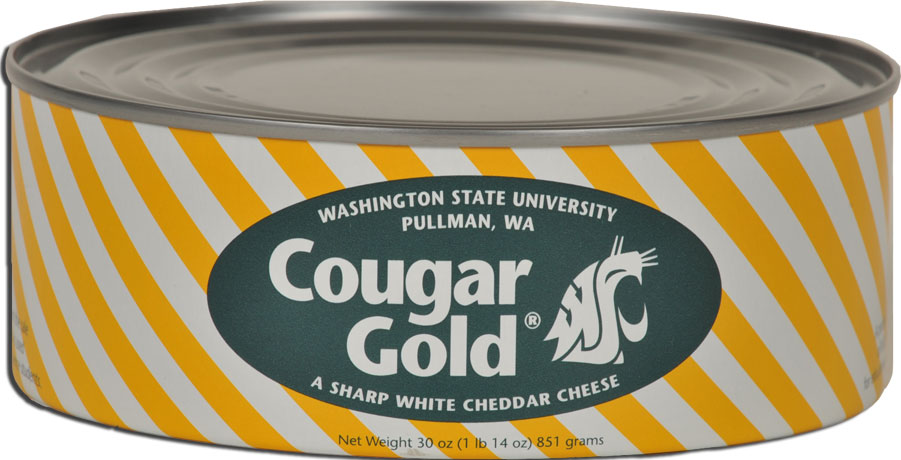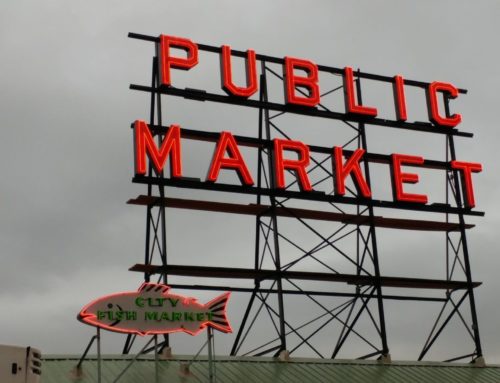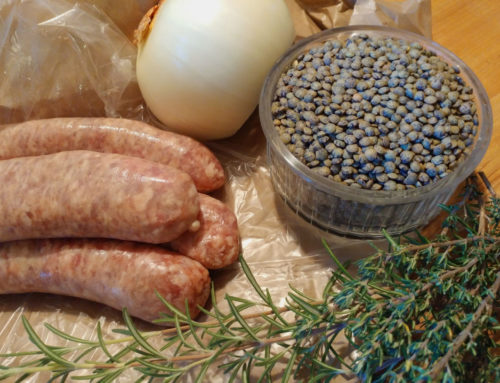What a delicious surprise it was. I showed up at my sister’s front door last weekend and followed her into the kitchen. “Do you want some cheese?” she asked. We were about to leave for lunch, so it seemed an odd offer, but then I understood. She and her husband had (finally) cracked open a can of Cougar Gold cheese that they’d gotten for Christmas in 1998. Yep, that’s right. A dozen years ago. And not only was it good, it was fantastic. Firm, nutty, rich with those interesting crystalline bits that form in older cheeses. What an amazing treat, that little nibble. “I’m going to make macaroni and cheese with some of it,” my brother-in-law said. Man alive, that was surely some spectacular mac’ and cheese.
The cheese in the can. It can throw people off, the 30-ounce portion of cheese enclosed in its cloak of metal. Folks who don’t know better wrinkle their noses at the idea, judging the product by its cover. And who’s to blame them? The can hints at a food perhaps more notable for its durability and ruggedness than for its flavor.
But they’d be wrong. This is no tub of processed cheese, or crazy little can of spray cheese.
Cougar Gold is one of the beloved iconic foods of the Northwest, and not just for the novelty of its packaging.
The cheese is made on the campus of Washington State University on the far eastern edge of the state, and has been since the 1940s. WSU has long housed agricultural programs, which has included managing herds of cows. The school’s dairy produced great quantities of milk to be served on campus during the school year. But when most of the students head back home for the summer, it’s hard to teach those cows to stop producing milk until they return in the fall. Cheese became a natural specialty of the dairy, a way to take full advantage of that milk going unused for those few months.
In the late 1930s, research was being done on campus in the realm of cheese packaging. Wax had long been a standard for enclosing cheese for long-term storage, but it was easily punctured and the cheese was rather vulnerable. About this same time, the American Can Company was doing research on commercial canning options for a great range of foods. But cheese was proving problematic. Many cheeses emit gasses as they age, so the cans bulged and burst, the product often became compromised.
Enter WSU food scientist Dr. N.S. Golding. He homed in on that problem and came to develop a cheese that would not emit gas while it aged, thus becoming an ideal candidate for canning. The school’s mascot is the cougar. The cheese’s developer was Dr. Golding. That’s how the delicious, cheddar-like Cougar Gold was born.
Over the years the WSU Creamery has added other cheeses to their program, including smokey cheddar and a number in the “Viking” family, a Monterey Jack style cheese that comes plain and in a range of flavors.
But Cougar Gold remains the jewel in the crown and represents the bulk of their production. To get your own can, you can order direct from WSU here (though shipping temporarily stops during the height of summer), at the very reasonable price of $20 for 30-ounce can, plus shipping [2022 update: the price now shows as $30 on the website; still quite reasonable for that much delicious cheese]. You might want to buy two. And exercise some patience to allow one to age in the back corner of your refrigerator for a few years. You’d have a ways to go to beat the record for the oldest known can of aged Cougar Gold recently tasted, however. That distinction goes to an alum who–at least at the time this article was written–had a can dating back to 1987. Just think of all the extra-indulgent macaroni and cheese he can make.





[…] an organic farm (Department of Crop and Soil Sciences), a creamery (producer of the famous Cougar Gold cheese among other things), a cattle ranch (Department of Animal Sciences), an orchard (Department […]